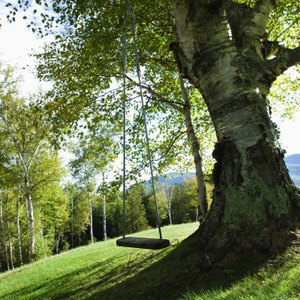
Being living organisms, trees grow and spread over time. A sapling planted 15 feet in from a property line in 1970 could today have branches, limbs or roots that extend far over the owner's property line. Once a property boundary has been crossed, a neighbor's trees can impact one's own property, causing damage to fences, sidewalks and other structures.
Trees and Property
Property owners in Massachusetts have the right to grow, trim and cut down trees on their own land. In certain historical districts, however, trees are protected even from their owners who must receive permission from the local municipality to trim or cut down a tree that is otherwise historically protected. Furthermore, homeowners may be liable under certain circumstances for damages their trees cause to another person's property.
Liability
A homeowner is liable for damages his tree cause to another person's property if it is proved that the tree was diseased or dying. However, if an otherwise healthy tree causes damage to another property because of, for example, a severe storm or lightning strike, then the tree's owner is not liable for the damages. The homeowner of the neighboring property may not cut down or trim a neighbor's tree, even if he believes it poses a threat to his own property. Section Seven in Chapter Seven of Massachusett's General Laws states clearly that anyone doing so without the tree owner's permission is liable to a damages payment of three times the assessed amount.
Right of Self Help
Massachusetts property owners are not without recourse, however. Commonwealth Law defines a "right of self help." If a tree's branches or roots from a neighboring property encroach onto one's own land, the property owner has the right to cut the portion of the roots, limbs or branches that are within his property line, but no further. In addition, the property owner must stay on his own property to make any cuts. The tree's owner, however, may sue his neighbor if the neighbor's actions lead to the death or harming of the tree that was cut.
No Culpability
While a property owner has a right of self-help when branches or roots from a neighbor's tree encroaches his property, he is not entitled to damages caused by the encroachment. For instance, the roots from the neighbor's tree might over time have broken up a concrete or asphalt driveway, or crushed boards from a privacy fence. The tree's owner is not liable for the damages, and the homeowner will have to bear any expenses for repair.
References
Writer Bio
Micah Rubenstein has been writing professionally since 1985. He was the editor of the online publication GrailWorld Magazine, the host and producer of the weekly "Message In Music" radio series and a former professor at Kenyon College in Gambier, Ohio. He teaches at Columbus State Community College and Granite State College in New Hampshire. He holds a Bachelor of Arts in music from Brown University.

